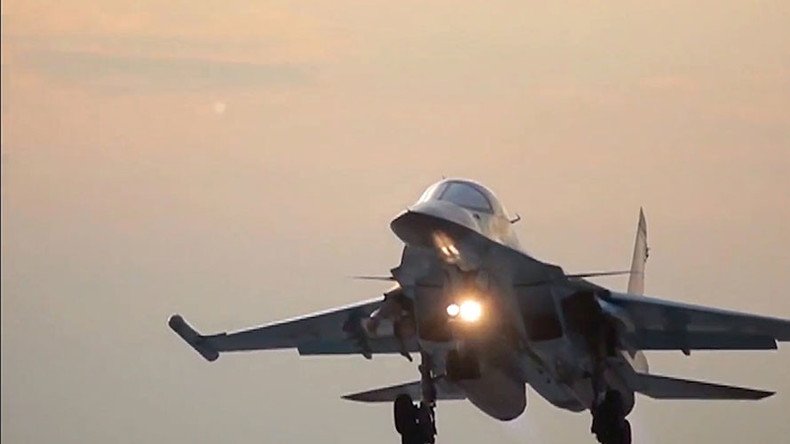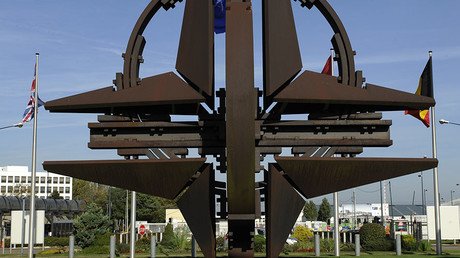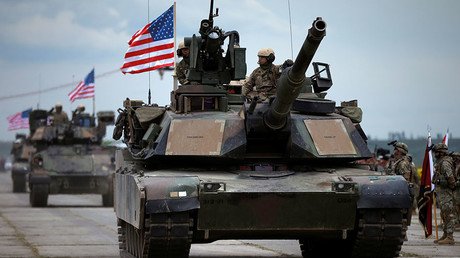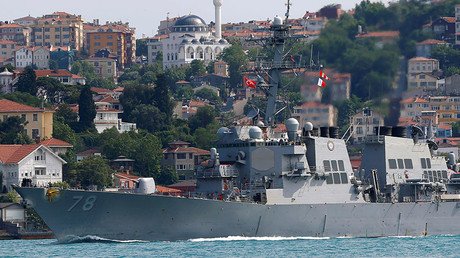Russia conducts snap air force combat readiness check, Western media accuse Moscow of ‘going to war'

The Russian Air Force has been put on high alert as part of a sudden combat readiness check ordered by President Vladimir Putin. The Western media reacted to the drills with headlines accusing Moscow of preparing for war.
“Today, in accordance with the order of the [Russian] Armed Forces Supreme Commander [President Vladimir Putin] a surprise inspection of the Aerospace Forces has been launched in order to evaluate the readiness of the military authorities and troops to carry out combat training missions,” Russian Defense Minister Sergey Shoigu said on Tuesday, as cited by TASS.
He stressed that “special attention should be paid to the combat alert missions, deployment of the air defense systems for a time of war and the readiness of the air groupings to repel aggression.” He then ordered tactical drills at all relevant military bases and within all relevant units.
Russian Aerospace Forces bases, as well as all aviation units, were put on high alert starting 09:00 Moscow time (06:00 GMT).
Separate drills were conducted by the air defense units of Russia’s Baltic Fleet in Russia's western Kaliningrad region bordering Lithuania and Poland. During the maneuvers, the air defense units equipped with S-400 long-range surface-to-air missile systems repelled a massive attack of a simulated aggressor, involving both airstrikes and missile strikes.
The S-400 systems successfully hit all 30 air targets during the exercises, TASS reports, citing a spokesman for the Baltic Fleet.
Earlier, Russian presidential spokesman, Dmitry Peskov, said the unscheduled checks are part of the existing practice of the Russian armed forces inspections. “This surprise check practice continues for more than one year,” Peskov told journalists, commenting on Putin’s order to put the Aerospace Forces on high alert. He also said, “the president and the defense minister repeatedly said that this practice would continue as it demonstrated quite positive results in maintaining a sufficient combat readiness level of our armed forces.”
However, and despite the Kremlin’s explanations, Western media covered the ad hoc drills as another example of 'Russian aggression.'
The International Business Times’s headline read “Is Russia going to war?” The Independent and the Daily Mail reported that Vladimir Putin ordered Russian air forces “to prepare for a time of war,” although the Russian president did not make any such remarks when issuing his command.
The Independent reported that Putin issued his order to “ensure” that Russian forces “are ready to fight” and added, “the preparations have already begun.” It also said Russia is planning to significantly increase the number of its tanks, armored vehicles, and aircraft. The Daily Mail said Putin “has been publicly increasing his military strength in recent months.”
Meanwhile, seven NATO countries and Ukraine are continuing their naval exercises hosted this time by Romania in the Black Sea. Sea Shield 2017 is scheduled to run between February 1 and 11.
According to the Romanian Navy, about 2,800 troops from Romania, Bulgaria, Greece, Turkey, Canada, the US, and Ukraine are taking part in the maneuvers. The naval drills involve 16 warships and 10 warplanes.
The exercises are held in the eastern part of the Black Sea, not far from Russia's borders. The troops are training to counter air, surface and underwater threats.
On February 1, Shoigu said the Russian Defense Ministry is closely monitoring the drills and watching over every move of the ships and planes taking part in the war games.
He also expressed hope that the drills would be held “without any provocations against Russia” but warned that Russian forces are “up to any challenge.”
NATO started a massive buildup on Russia's borders following the Crimean referendum which voted to split from the Ukraine and rejoin Russia in April 2014.
In July 2016, NATO members agreed to the “biggest reinforcement since the Cold War,” posting four multinational battalions to Estonia, Latvia, Lithuania and Poland.
Apart from the military buildup near Russia's borders, the US and NATO strategy also includes conducting continuous, enhanced multinational training and security cooperation activities with partners in eastern Europe. Since the operation began, these military exercises have been conducted in Estonia, Latvia, Lithuania, Poland, Romania, Bulgaria and Hungary.
While NATO members continue to point at the perceived “Russian aggression,” calling it “a source of instability,” Russia has consistently denied any allegations of this perceived threat.
Moscow has also expanded its own military training exercises. The ad hoc inspections of the Russian armed forces combat readiness have become a regular practice since early 2013.















